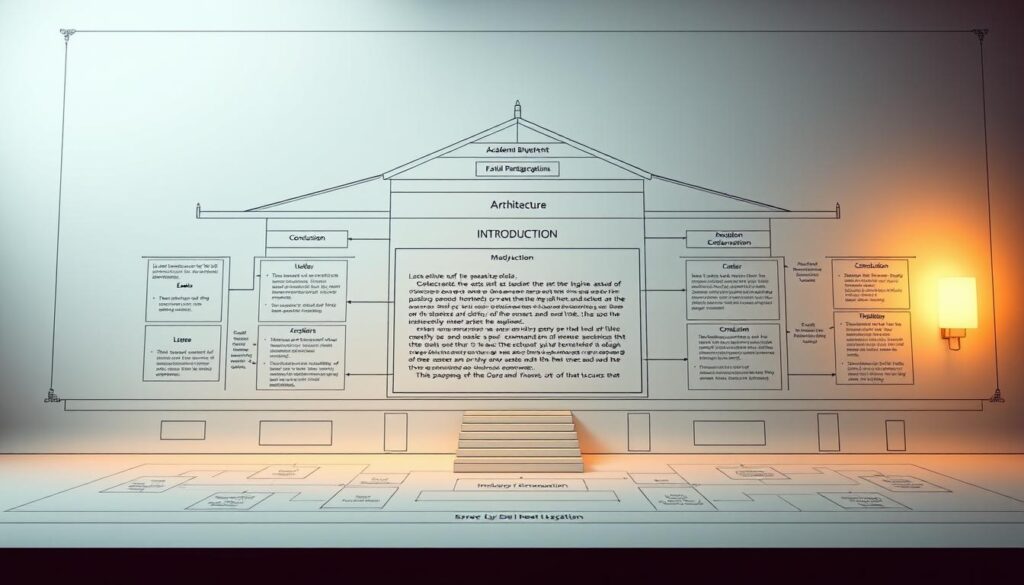Are you struggling to achieve a high band score in your IELTS essay? Many candidates face challenges in this critical section, but the right strategies can make all the difference. Whether you’re preparing for the Academic or General Training module, mastering the IELTS Writing Task 2 is essential for success.
This article will guide you through proven techniques to tackle various question types, from opinion essays to problem-solution formats. We’ll explore how to balance grammar, vocabulary, and structure to create clear and compelling essays. With actionable steps and real examples, you’ll gain the confidence to write effectively under time constraints.
Practice and feedback are key components of preparation. By following our expert advice, you’ll learn how to address specific instructions, avoid common mistakes, and present your ideas cohesively. Let’s dive into the strategies that will help you achieve your desired band score.
Key Takeaways
- Understand the importance of grammar, vocabulary, and structure in your essay.
- Learn proven techniques to tackle different question types effectively.
- Practice regularly and seek feedback to improve your writing skills.
- Focus on addressing specific instructions to avoid losing points.
- Use real examples and data to strengthen your arguments.
Understanding the IELTS Writing Task 2 Format
Understanding the structure of the IELTS essay can significantly boost your performance. This section of the exam requires a clear, well-organized response to a given question. Let’s break down the key components to help you excel.
Exam Structure & Timing
The writing section allocates 40 minutes for this task. Candidates must write at least 250 words. Failing to meet this requirement can result in penalties. Proper time management is essential to ensure all parts of the question are addressed.

Task 2 Essay Requirements
Your essay should include an introduction, body paragraphs, and a conclusion. Each section must flow logically, with clear connections between ideas. Examiners assess your ability to use language effectively and avoid common mistakes.
Here’s a breakdown of the key requirements:
| Component | Details |
|---|---|
| Word Count | Minimum 250 words |
| Time Allocation | 40 minutes |
| Structure | Introduction, Body, Conclusion |
| Assessment Criteria | Task Achievement, Coherence, Lexical Resource, Grammar |
Addressing every part of the question is crucial. For example, if the prompt asks for advantages and disadvantages, ensure both are discussed. Use a sample essay as a guide to understand how to structure your response effectively.
“A well-structured essay not only meets the word count but also demonstrates clarity and logical progression.”
By understanding the format and practicing regularly, you can avoid common pitfalls and improve your performance. Focus on using precise language and organizing your ideas coherently to achieve a high score.
Mastering Question Structure in ielts writing task 2
Breaking down the question is the first step to crafting a high-scoring essay. A clear understanding of the question components ensures your response is relevant and well-organized. Let’s explore how to interpret and structure your essay effectively.
Interpreting Question Components
Every question has specific parts that guide your response. For example, an Opinion type requires a clear stance, while a Problem-Solution type demands critical thinking. Identifying these components helps you stay on track.

- Identify the main topic and key instructions.
- Determine the type of essay required (e.g., Opinion, Discussion).
- Highlight any specific instructions, such as “discuss both views.”
For instance, a question like “What are the advantages and disadvantages of technology in education?” requires a balanced response. Addressing both parts ensures you meet the structure expectations.
Strategies for Organizing Ideas
Once you understand the question, organize your ideas logically. Start with an introduction that clearly states your position. Use body paragraphs to develop your arguments, and conclude by summarizing your points.
Here are some practical tips:
- Use bullet points to outline your ideas before writing.
- Allocate time for planning, writing, and revising.
- Ensure each paragraph flows smoothly into the next.
A well-structured essay not only addresses the question but also demonstrates clarity and coherence. By practicing these techniques, you’ll improve your ability to interpret and respond effectively.
Decoding the Scoring Criteria and Exam Requirements
To achieve a top band score, it’s essential to know how your essay is assessed. Examiners evaluate responses based on specific criteria, including task response, coherence, lexical resource, and grammatical accuracy. Understanding these components can help you craft a high-performing essay.

Band Descriptors and Evaluation
Each band score reflects a specific level of performance. For example, a Band 9 essay demonstrates excellent grammar, vocabulary, and coherence. Examiners look for clear opinions, well-supported reasons, and logical organization.
Here’s a breakdown of the key evaluation areas:
| Criteria | Description |
|---|---|
| Task Response | Addresses all parts of the question with relevant ideas. |
| Coherence | Ideas are logically organized and connected. |
| Lexical Resource | Uses a wide range of vocabulary accurately. |
| Grammar | Demonstrates varied sentence structures and accuracy. |
Achieving Coherence and Task Response
Coherence ensures your essay flows smoothly. Use linking words like “however” and “therefore” to connect ideas. Task response requires addressing every part of the question. For example, if the prompt asks for advantages and disadvantages, discuss both clearly.
Here are some tips to align with marking standards:
- Plan your response before writing.
- Use specific examples to support your points.
- Avoid common pitfalls like off-topic arguments.
“A well-structured essay not only meets the word count but also demonstrates clarity and logical progression.”
By focusing on these areas, you can craft an essay that meets the highest standards and achieves your desired band score.
Essential Preparation and Practice Tips
Effective preparation is the cornerstone of success in mastering essay writing challenges. By focusing on structured practice and utilizing the right resources, you can significantly improve your performance. Let’s explore actionable strategies to enhance your skills.
Utilizing Practice Essay Questions
Practice essay questions are invaluable for generating ideas and refining your structure. Start by analyzing the question type, whether it’s an opinion or problem-solution format. This helps you tailor your response effectively.

- Set a timer to simulate exam conditions.
- Focus on addressing all parts of the question.
- Review your answers to identify areas for improvement.
Incorporating Model Essays for Guidance
Model essays serve as excellent benchmarks for high-scoring responses. Study how these essays structure their arguments and use vocabulary. Pay attention to how they address the question and maintain coherence.
Key benefits of using model essays:
- Learn advanced vocabulary and sentence structures.
- Understand how to develop and support ideas.
- Gain insights into effective paragraph organization.
Feedback and Self-Evaluation Strategies
Constructive feedback is essential for growth. Seek expert assessments or peer reviews to identify strengths and weaknesses. Self-evaluation also plays a crucial role in tracking progress.
Effective self-evaluation methods:
- Compare your essays to high-scoring samples.
- Focus on improving grammar, vocabulary, and coherence.
- Regularly revisit past essays to measure improvement.
By following these essential preparation and practice tips, you’ll build confidence and consistency in your writing. For more detailed guidance, explore our essential preparation and practice tips.
Building a Strong Essay Framework
Crafting a well-organized essay is key to achieving a high score. A clear and logical structure ensures your ideas flow smoothly, making it easier for examiners to follow your argument. Let’s explore the fundamentals of creating a compelling framework.
Essay Structure Fundamentals
Every essay should begin with a strong introduction. This section sets the tone and clearly states your main argument. Use the first sentence to grab attention and provide context. Follow this with a thesis statement that outlines your key points.

Body paragraphs are the heart of your essay. Each one should focus on a single point, supported by evidence or examples. Start with a topic sentence that introduces the main idea. Then, develop your argument logically, ensuring each paragraph connects to the next.
Organizing Paragraphs Effectively
Effective organization is crucial for coherence. Use transitional phrases like “however” or “in addition” to link ideas. This helps maintain a smooth flow and guides the reader through your argument.
Here are some tips for organizing your paragraphs:
- Start with a clear topic sentence.
- Support your main idea with relevant examples.
- End each paragraph with a concluding statement that ties back to your thesis.
Finally, your conclusion should summarize your key points and restate your thesis. Avoid introducing new information here. Instead, focus on reinforcing your argument and leaving a lasting impression.
“A well-structured essay not only meets the word count but also demonstrates clarity and logical progression.”
By following these guidelines, you can create a balanced framework that improves readability and boosts your score. Practice regularly to refine your skills and build confidence in your writing.
Enhancing Vocabulary and Grammar for IELTS Writing
Improving your vocabulary and grammar is a game-changer for achieving a high score. A strong command of language allows you to express ideas clearly and effectively. This section provides actionable strategies to expand your word range and avoid common mistakes.

Using Advanced Lexical Resources
Expanding your vocabulary is essential for crafting compelling essays. Focus on learning synonyms, collocations, and phrases that add depth to your writing. For example, instead of using “important,” opt for “crucial” or “significant.”
Here are some tips to enhance your language skills:
- Read academic articles to discover advanced words.
- Practice using new vocabulary in context.
- Use a thesaurus to explore a broader range of terms.
Avoiding Common Language Pitfalls
Grammatical errors can lower your score, even if your ideas are strong. Common mistakes include incorrect article usage, subject-verb agreement, and preposition errors. Identify your weak areas and focus on improving them.
Strategies to avoid problems:
- Review grammar rules regularly.
- Practice writing and self-correcting your work.
- Seek feedback from experts or peers.
By developing a broad range of language skills, you can create essays that are both engaging and error-free. Use diversified sentence structures to keep your writing dynamic and impactful.
“A well-chosen word can transform a sentence, making your essay stand out.”
Leveraging Web Sources and Model Essays
Harnessing online resources can significantly elevate your essay preparation process. With a wealth of tools and expert assessments available, you can refine your skills and achieve better results. This section explores how to make the most of these resources to enhance your performance.
Insights from IDP and Expert Assessments
Trusted sources like IDP provide model essays that serve as excellent benchmarks. These examples demonstrate how to structure your essay effectively and address the question comprehensively. By studying these models, you can learn advanced techniques and avoid common pitfalls.

Expert assessments offer personalized feedback to identify areas for improvement. Whether it’s grammar, vocabulary, or coherence, these insights help you refine your writing approach. Use this feedback to focus on specific weaknesses and build on your strengths.
Real-World Sample Answers Analysis
Analyzing real-world sample answers provides practical insights into effective strategies. Look for patterns in how high-scoring essays address the question and present their opinion. This analysis helps you understand what examiners are looking for in a top-tier answer.
Here’s a breakdown of key elements to focus on:
| Element | Description |
|---|---|
| Structure | Clear introduction, body, and conclusion. |
| Coherence | Logical flow and linking between ideas. |
| Vocabulary | Advanced and varied word choices. |
| Grammar | Accurate and varied sentence structures. |
Webinars and video tutorials also offer dynamic ways to learn. These resources often include step-by-step guides and real-time demonstrations of successful strategies. Incorporate these tools into your preparation routine for a well-rounded approach.
By leveraging web sources and model essays, you can gain a deeper understanding of what it takes to excel. Use these resources to refine your techniques, track your progress, and achieve your goals.
Integrating Technology and Modern Learning Tools
Modern technology has revolutionized the way students prepare for standardized tests. With the rise of online platforms and digital resources, learners now have access to tools that make studying more efficient and effective. These innovations are particularly beneficial for those aiming to excel in their academic goals.

Benefits of Online Courses and Webinars
Online courses and webinars offer unparalleled flexibility, allowing students to learn at their own pace. These platforms provide structured lessons tailored to specific needs, making it easier to focus on areas that require improvement. For example, a student can access a webinar on essay structure or a course on advanced vocabulary.
Interactive platforms also enhance practice sessions. Many websites offer mock tests and real-time feedback, helping learners identify their strengths and weaknesses. This immediate feedback is crucial for refining skills and building confidence.
Here are some key advantages of using digital tools:
- Flexible schedules that fit into busy routines.
- Access to a wide range of resources, including video tutorials and practice tests.
- Immediate feedback to track progress and adjust strategies.
Educational Apps and Websites
Several apps and websites specialize in providing comprehensive lessons for test preparation. These platforms often include features like progress tracking, personalized study plans, and interactive exercises. For instance, apps like Duolingo and websites like Khan Academy offer modules specifically designed for education and skill-building.
Here’s a comparison of popular tools:
| Tool | Features |
|---|---|
| Duolingo | Interactive exercises, progress tracking, gamified learning. |
| Khan Academy | Comprehensive lessons, practice tests, personalized study plans. |
| Coursera | Expert-led courses, certifications, flexible schedules. |
By leveraging these tools, students can manage their time more effectively and achieve higher scores. Technology not only simplifies the learning process but also makes it more engaging and accessible.
“Technology in education is not just a tool; it’s a bridge to achieving academic excellence.”
Incorporating modern learning tools into your preparation routine can significantly enhance your performance. With the right resources and strategies, you can build the skills needed to succeed.
Conclusion
Mastering the art of essay composition requires a strategic approach and consistent effort. By focusing on structure, vocabulary, and clear expression of your opinion, you can achieve a high score. Preparation and regular practice are essential to refine your skills and build confidence.
Integrating expert insights and modern tools can significantly enhance your performance. A well-crafted conclusion not only summarizes your key points but also leaves a lasting impression. Use cohesive devices to ensure your ideas flow logically and stay relevant to the topic.
We encourage you to apply these techniques and explore further resources for steady progress. With dedication and the right strategies, you can excel in your academic goals and achieve the results you desire.
FAQ
What is the format of the IELTS Writing Task 2?
The format includes a 40-minute essay task where you must respond to a given prompt. You’ll need to write at least 250 words, presenting a clear argument or discussion with well-structured paragraphs.
How is the IELTS Writing Task 2 scored?
Scoring is based on four criteria: Task Response, Coherence and Cohesion, Lexical Resource, and Grammatical Range and Accuracy. Each criterion contributes equally to your final band score.
What are the key components of a high-scoring essay?
A high-scoring essay includes a clear introduction, well-developed body paragraphs, and a strong conclusion. It should also demonstrate advanced vocabulary, grammatical accuracy, and logical flow.
How can I improve my vocabulary for the IELTS Writing Task 2?
Focus on learning topic-specific words and phrases. Practice using synonyms and collocations, and avoid repetition by expanding your lexical range.
What are common mistakes to avoid in the IELTS Writing Task 2?
Common mistakes include not addressing the task fully, poor paragraph organization, overusing simple vocabulary, and making frequent grammatical errors.
How can I practice effectively for the IELTS Writing Task 2?
Use practice prompts to write essays regularly. Analyze model answers, seek feedback from tutors, and focus on improving weak areas through targeted exercises.
Are online courses helpful for IELTS Writing Task 2 preparation?
Yes, online courses and webinars provide structured lessons, expert guidance, and access to valuable resources like sample essays and scoring tips.
How important is time management during the IELTS Writing Task 2?
Time management is crucial. Allocate 5 minutes for planning, 30 minutes for writing, and 5 minutes for reviewing and editing your essay.


